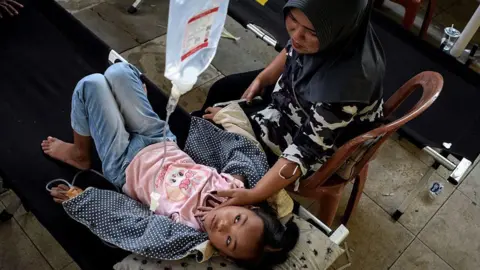Indonesian President's First Year: Balancing Protests and Food Safety Concerns

When Prabowo Subianto campaigned to become Indonesia's new president, he promised dynamic economic growth and major social change. However, his first year in office has not fulfilled this populist platform. Rather, his ambitious pledges have been confronted by the realities of Southeast Asia's largest economy.
Protests erupted in late August as frustrated youth rallied against rising living costs and corruption, leading to government backlash and the retraction of perks for politicians that fueled public outrage. Earlier demonstrations also manifested against budget cuts affecting critical sectors like healthcare and education.
These protests have coincided with a costly free school meals program, central to Prabowo's agenda, which aims to combat child malnutrition while enhancing education outcomes. Despite intense support, recent reports of food poisoning among over 9,000 children have raised alarm bells about the program's efficacy, as images circulate of ill students requiring medical treatments.
Analysts contend that these public health setbacks expose deeper vulnerabilities within public spending and economic management in Indonesia's $1.4 trillion economy.
Mounting Discontent on the Streets
Indonesia, home to over 280 million inhabitants across its vast archipelago, is under pressure from declining global demands and rising living costs. While the economy exhibits steady growth of approximately 5%, these challenges juxtapose against the rapid competition from neighbors like Vietnam and Malaysia, which are attracting foreign investments.
The August protests, which resulted in multiple fatalities, reflected widespread frustration directed towards the Prabowo administration, accused of prioritizing grand ambitions over essential economic support.
Despite facing criticism, Prabowo and his ministers advocate for their policies, asserting they will stimulate job creation and economic demand.
With aspirations to boost economic growth to 8% by 2029, Prabowo is proactive in mentioning Indonesia's potential for significant development. However, experts warn that achieving these projections necessitates prudent fiscal management and increased foreign investments.
Investment Challenges Amid Tariffs
Indonesia faces additional challenges from external factors such as the trade war imposed by the U.S., resulting in significant tariffs on exports that add financial burdens to export businesses. In counteracting these pressures, Indonesia recently finalized a trade agreement with the EU, seeking to leverage its rich natural resources.
Even as the government pushes for an investment drive within the digital economy, experts question whether Indonesia can equip its workforce with necessary skills to match evolving industrial needs.
Compounding these concerns is the abrupt removal of the former finance minister, a respected voice in fiscal responsibility, which further complicates Indonesia's financial landscape.
Prabowo's presidency marks a pivotal period for Indonesia. The road ahead is fraught with challenges, as rising public discontent, financial uncertainties, and the pressing necessity for effective policies informed by robust management become ever more crucial for his government’s sustainability.




















